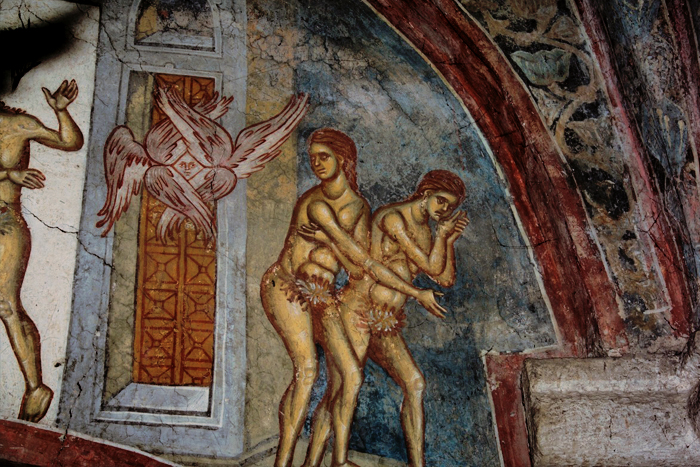
In order to understand many major theological problems, which arose between East and West both before and after the schism, the extraordinary impact upon Western thought of Augustine’s polemics against Pelagius and Julian of Eclanum must be fully taken into account. In the Byzantine world where Augustinian thought exercised practically no influence, the significance of the sin of Adam and of its consequences for mankind was understood along quite different lines.
We have seen that in the East man’s relationship with God was understood as a communion of the human person with that, which is above nature. “Nature” therefore designates that, which is, in virtue of creation, distinct from God. But nature can and must be transcended; this is the privilege and the function of the free mind made “according to God’s image.”
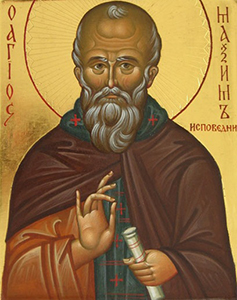
Now, in Greek patristic thought, only this free, personal mind can commit sin and incur the concomitant “guilt” — a point made particularly clear by Maximos the Confessor in his distinction between “natural will” and “gnomic will.” Human nature as God’s creature always exercises its dynamic properties (which together constitute the “natural will” — a created dynamism) in accordance with the divine will, which creates it. But when the human person, or hypostasis, by rebelling against both God and nature misuses its freedom, it can distort the “natural will” and thus corrupt nature itself. It is able to do so because it possesses freedom, or “gnomic will,” which is capable of orienting man toward the good and of “imitating God” (“God alone is good by nature,” writes Maximos, “and only God’s imitator is good by his gnome“); it is also capable of sin because “our salvation depends on our will.” But sin is always a personal act and never an act of nature. Patriarch Photios even goes so far as to say, referring to Western doctrines, that the belief in a “sin of nature” is a heresy.
From these basic ideas about the personal character of sin, it is evident that the rebellion of Adam and Eve against God could be conceived only as their personal sin; there would be no place, then, in such an anthropology for the concept of inherited guilt, or for a “sin of nature,” although it admits that human nature incurs the consequences of Adam’s sin.
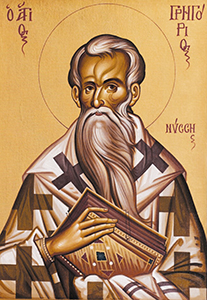
The Greek patristic understanding of man never denies the unity of mankind or replaces it with a radical individualism. The Pauline doctrine of the two Adams (“As in Adam all men die, so also in Christ all are brought to life” [1 Co 15:22]) as well as the Platonic concept of the ideal man leads Gregory of Nyssa to understand Genesis 1:27 — “God created man in His own image” — to refer to the creation of mankind as a whole. It is obvious therefore that the sin of Adam must also be related to all men, just as salvation brought by Christ is salvation for all mankind; but neither original sin nor salvation can be realized in an individual’s life without involving his personal and free responsibility.
The scriptural text, which played a decisive role in the polemics between Augustine and the Pelagians, is found in Romans 5:12 where Paul speaking of Adam writes, “As sin came into the world through one man and through sin, death, so death spread to all men because all men have sinned [eph ho pantes hemarton].” In this passage there is a major issue of translation. The last four Greek words were translated in Latin as in quo omnes peccaverunt (“in whom [i.e., in Adam] all men have sinned”), and this translation was used in the West to justify the doctrine of guilt inherited from Adam and spread to his descendants. But such a meaning cannot be drawn from the original Greek — the text read, of course, by the Byzantines. The form eph ho — a contraction of epi with the relative pronoun ho — can be translated as “because,” a meaning accepted by most modern scholars of all confessional backgrounds. Such a translation renders Paul’s thought to mean that death, which is “the wages of sin” (Romans 6:23) for Adam, is also the punishment applied to those who like him sin. It presupposed a cosmic significance of the sin of Adam, but did not say that his descendants are “guilty” as he was unless they also sinned as he did.
A number of Byzantine authors, including Photios, understood the eph ho to mean “because” and saw nothing in the Pauline text beyond a moral similarity between Adam and other sinners in death being the normal retribution for sin. But there is also the consensus of the majority of Eastern Fathers, who interpret Romans 5:12 in close connection with 1 Corinthians 15:22 — between Adam and his descendants there is a solidarity in death just as there is a solidarity in life between the risen Lord and the baptized. This interpretation comes, obviously, from the literal, grammatical meaning of Romans 5:12. Eph ho, if it means “because,” is a neuter pronoun; but it can also be masculine referring to the immediately preceding substantive thanatos (“death”). The sentence then may have a meaning, which seems improbable to a reader trained in Augustine, but which is indeed the meaning which most Greek Fathers accepted: “As sin came into the world through one man and death through sin, so death spread to all men; and because of death, all men have sinned…”
Mortality, or “corruption,” or simply death (understood in a personalized sense), has indeed been viewed since Christian antiquity as a cosmic disease, which holds humanity under its sway, both spiritually and physically, and is controlled by the one who is “the murderer from the beginning” (John 8:44). It is this death, which makes sin inevitable and in this sense “corrupts” nature.
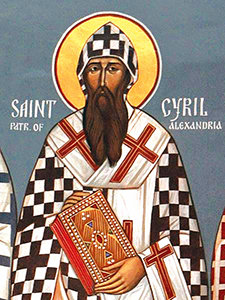
For Cyril of Alexandria, humanity after the sin of Adam “fell sick of corruption.” Cyril’s opponents, the theologians of the School of Antioch, agreed with him on the consequence of Adam’s sin. For Theodore of Mopsuestia, “by becoming mortal, we acquired greater urge to sin.” The necessity of satisfying the needs of the body — food, drink, and other bodily needs — are absent in immortal beings; but among mortals, they lead to “passions,” for they present unavoidable means of temporary survival. Theodoret of Cyrus repeats almost literally the arguments of Theodore in his own commentary on Romans; elsewhere, he argues against the sinfulness of marriage by affirming that transmission of mortal life is not sinful in itself, in spite of Psalm 51:7 (“my mother conceived me in sin”). This verse, according to Theodoret, refers not to the sexual act but to the general sinful condition of mortal humanity: “Having become mortal, [Adam and Eve] conceived mortal children, and mortal beings are a necessarily subject to passions and fears, to pleasures and sorrows, to anger and hatred.”
There is indeed a consensus in Greek patristic and Byzantine traditions in identifying the inheritance of the Fall as an inheritance essentially of mortality rather than of sinfulness, sinfulness being merely a consequence of mortality. The idea appears in Chrysostom, who specifically denies the imputation of sin to the descendants of Adam; in the eleventh-century commentator Theophylact of Ohrida; and in later Byzantine authors, particularly in Gregory Palamas. The always-more-sophisticated Maximos the Confessor, when he speaks of the consequences of the sin of Adam, identifies them mainly with the mind’s submission to the flesh and finds in sexual procreation the most obvious expression of man’s acquiescence in animal instincts; but as we have seen, sin remains, for Maximos, a personal act, and inherited guilt is impossible. For him, as for the others, “the wrong choice made by Adam brought in passion, corruption, and mortality,” but not inherited guilt.
The contrast with Western tradition on this point is brought into sharp focus when Eastern authors discuss the meaning of baptism. Augustine’s arguments in favor of infant baptism were taken from the text of the creeds (baptism for “the remission of sins”) and from his understanding of Romans 5:12. Children are born sinful, not because they have sinned personally, but because they have sinned “in Adam”; their baptism is therefore also a baptism “for the remission of sins.” At the same time, an Eastern contemporary of Augustine’s, Theodoret of Cyrus, flatly denies that the creedal formula “for the remission of sins” is applicable to infant baptism. For Theodoret, in fact, the “remission of sins” is only a side effect of baptism, fully real in cases of adult baptism, which is the norm, of course, in the early Church and which indeed “remits sins.” But the principal meaning of baptism is wider and more positive: “If the only meaning of baptism is the remission of sins,” writes Theodoret, “why would we baptize the newborn children who have not yet tasted of sin? But the mystery [of baptism] is not limited to this; it is a promise of greater and more perfect gifts. In it, there are the promises of future delights; it is a type of the future resurrection, a communion with the master’s passion, a participation in His resurrection, a mantle of salvation, a tunic of gladness, a garment of light, or rather it is light itself.”
Thus, the Church baptizes children not to “remit” their yet nonexistent sins, but in order to give them a new and immortal life, which their mortal parents are unable to communicate to them. The opposition between the two Adams is seen in terms not of guilt and forgiveness but of death and life. “The first man was from the earth, a man of dust; the second man is from heaven; as was the man of dust, so are those who are of the dust, and as is the man of heaven, so are those who are of heaven” (1 Corinthians 15:47-48). Baptism is the paschal mystery, the “passage.” All its ancient forms, especially the Byzantine, include a renunciation of Satan, a triple immersion as type of death and resurrection, and the positive gift of new life through anointing and Eucharistic communion.

In this perspective, death and mortality are viewed, not so much as retribution for sin (although they are also a just retribution for personal sins) but as means through which the fundamentally unjust “tyranny” of the devil is exercised over mankind after Adam’s sin. From this, baptism is liberation, because it gives access to the new immortal life brought into the world by Christ’s Resurrection. The Resurrection delivers men from the fear of death and, therefore, also from the necessity of struggling for existence. Only in the light of the risen Lord does the Sermon on the Mount acquire its full realism: “Do not be anxious about your life, what you shall eat or what you shall drink, nor about your body, what you shall put on. Is not life more than food, and the body more than clothing?” (Matthew 6:25).
Communion in the risen body of Christ, participation in divine life, sanctification through the energy of God, which penetrates true humanity and restores it to its “natural” state rather than justification, or remission of inherited guilt, — these are at the center of Byzantine understanding of the Christian Gospel. [Fr. John Meyendorff, Byzantine Theology, (New York: Fordham University Press, 1983), pages 143-146]

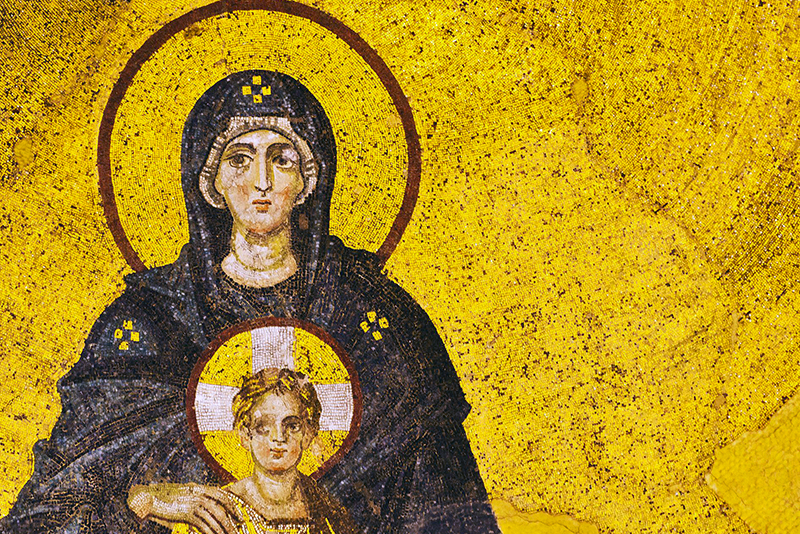
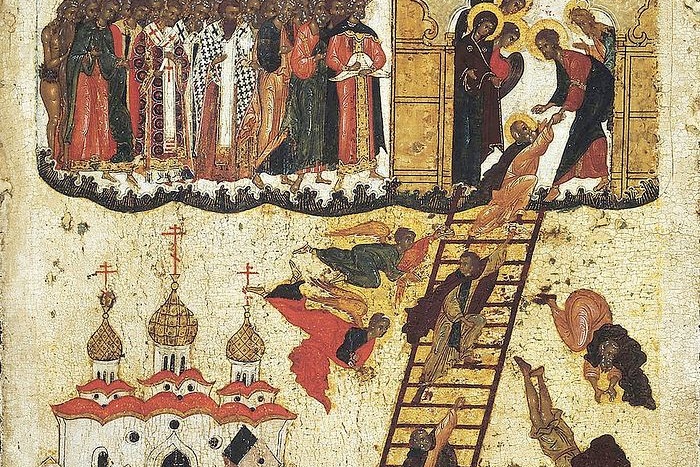

Catechism of the Catholic Church:
The consequences of Adam’s sin for humanity
402 All men are implicated in Adam’s sin, as St. Paul affirms: “By one man’s disobedience many (that is, all men) were made sinners”: “sin came into the world through one man and death through sin, and so death spread to all men because all men sinned.”289 The Apostle contrasts the universality of sin and death with the universality of salvation in Christ. “Then as one man’s trespass led to condemnation for all men, so one man’s act of righteousness leads to acquittal and life for all men.”290
403 Following St. Paul, the Church has always taught that the overwhelming misery which oppresses men and their inclination towards evil and death cannot be understood apart from their connection with Adam’s sin and the fact that he has transmitted to us a sin with which we are all born afflicted, a sin which is the “death of the soul”.291 Because of this certainty of faith, the Church baptizes for the remission of sins even tiny infants who have not committed personal sin.292
404 How did the sin of Adam become the sin of all his descendants? the whole human race is in Adam “as one body of one man”.293 By this “unity of the human race” all men are implicated in Adam’s sin, as all are implicated in Christ’s justice. Still, the transmission of original sin is a mystery that we cannot fully understand. But we do know by Revelation that Adam had received original holiness and justice not for himself alone, but for all human nature. By yielding to the tempter, Adam and Eve committed a personal sin, but this sin affected the human nature that they would then transmit in a fallen state.294 It is a sin which will be transmitted by propagation to all mankind, that is, by the transmission of a human nature deprived of original holiness and justice. and that is why original sin is called “sin” only in an analogical sense: it is a sin “contracted” and not “committed” – a state and not an act.
405 Although it is proper to each individual,295 original sin does not have the character of a personal fault in any of Adam’s descendants. It is a deprivation of original holiness and justice, but human nature has not been totally corrupted: it is wounded in the natural powers proper to it, subject to ignorance, suffering and the dominion of death, and inclined to sin – an inclination to evil that is called concupiscence”. Baptism, by imparting the life of Christ’s grace, erases original sin and turns a man back towards God, but the consequences for nature, weakened and inclined to evil, persist in man and summon him to spiritual battle.